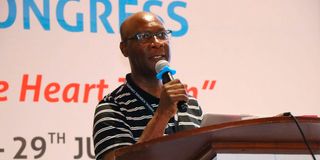Doctors raise red flag over surge in heart disease deaths

Kenya Cardiac Society president and consultant cardiologist, Dr Bernard Samia, addressing the annual Scientific Conference at Sarova Whitesands in Mombasa County. The Society has expressed concern over the rising cardiovascular disease-related deaths in the country.
What you need to know:
- About 30 per cent of hospital admissions are due to non-communicable diseases, with a bulk of them being cardiovascular diseases (CDVs).
- CDVs are disorders of the heart and blood vessels and are the leading cause of death globally.
An increase in the number of people dying of cardiovascular diseases in Kenya has worried cardiologists.
About 30 per cent of hospital admissions are due to non-communicable diseases, with a bulk of them being cardiovascular diseases (CDVs), according to consultant cardiologist Bernard Samia, the Kenya Cardiac Society (KCS) president.
Addressing the annual Scientific Conference at Sarova Whitesands, Mombasa, Dr Samia (pictured) noted that 15 per cent of all hospital deaths in the past five years are due to cardiovascular diseases, terming the situation costly for the country.
“Data shows an exponential increase in cardiovascular diseases both in morbidity (disease burden) and mortality. A lot of these diseases can be prevented by certain lifestyle measures in the communities at minimal cost,” Dr Samia said.
CDVs are disorders of the heart and blood vessels and are the leading cause of death globally.
Dr Samia noted that one of the challenges they continue to face as cardiovascular health workers is lack of sufficient resources in terms of personnel and equipment.
“We are discussing how to optimise the use of the scarce resources we have, but we also have the opportunity to interact with the national and county governments to see how they can appropriately channel what is available to the treatment of cardiovascular diseases.”
Dr Lois Wagana, a physician cardiologist and executive member of the KCS, said the risk factors for cardiovascular diseases are increasing. “These risk factors are with us and are mainly related to our changing lifestyle. We are becoming more sedentary; we don’t exercise as much; we don’t walk as much. We use vehicular transport, and motorbikes where we would ordinarily walk, reducing physical exercise.”
Dr Wagana urged the government to zero-rate tax on some of the products used in the treatment of cardiovascular diseases such as pacemakers and stents. A pacemaker is a small electronic device implanted in the chest to help regulate heart function, while stents are tiny tubes inserted into a blocked passageway to keep it open. They restore the flow of blood or other fluids. Doctors implant them during open heart surgeries when patients have blocked arteries or heart valves.
A pacemaker costs between Sh160,000-Sh180,000. “They are expensive in Kenya, but if you go to Middle East countries or Egypt, they are cheaper by 40 per cent. If we had taxes on these devices zero-rated, it would significantly reduce the cost of these procedures,” Dr Wagana said.
Kenya has about 100 cardiologists. “Training is rigorous – the duration is about 13 years (six years of medical, a year of internship, three years of residency and three years of fellowship) – and requires significant input in terms of an enabling environment and opportunities to favour gender balance,” she stated.
In terms of human resources, the society added that they require support staff like nurses trained in cardiac intervention, clinical officers and people trained in cardiac imaging.
“For every single cardiologist we have, there will be a need for another five to 10 paramedical personnel for a wholesome delivery of healthcare. The society admits that in terms of distribution, three-quarters of cardiologists are in Nairobi,” she said.
Dr Samia urged the county governments to set up tertiary centres for cardiovascular care as most counties tend to invest more in primary aspects, “which is okay”.





